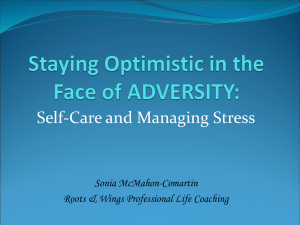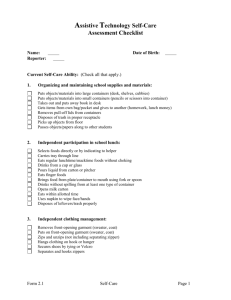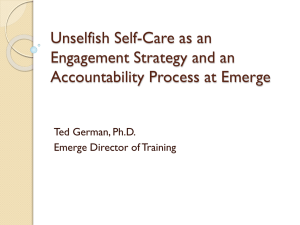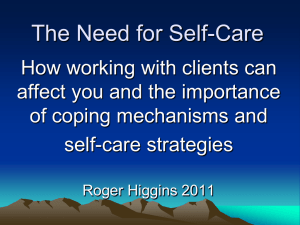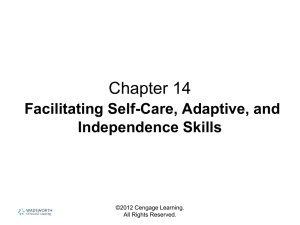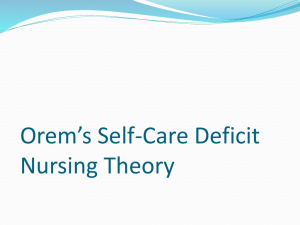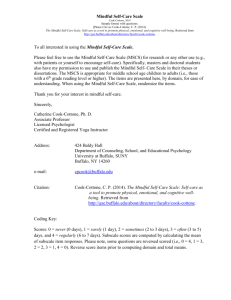Leaving it at the office: Psychotherapist self-care
advertisement
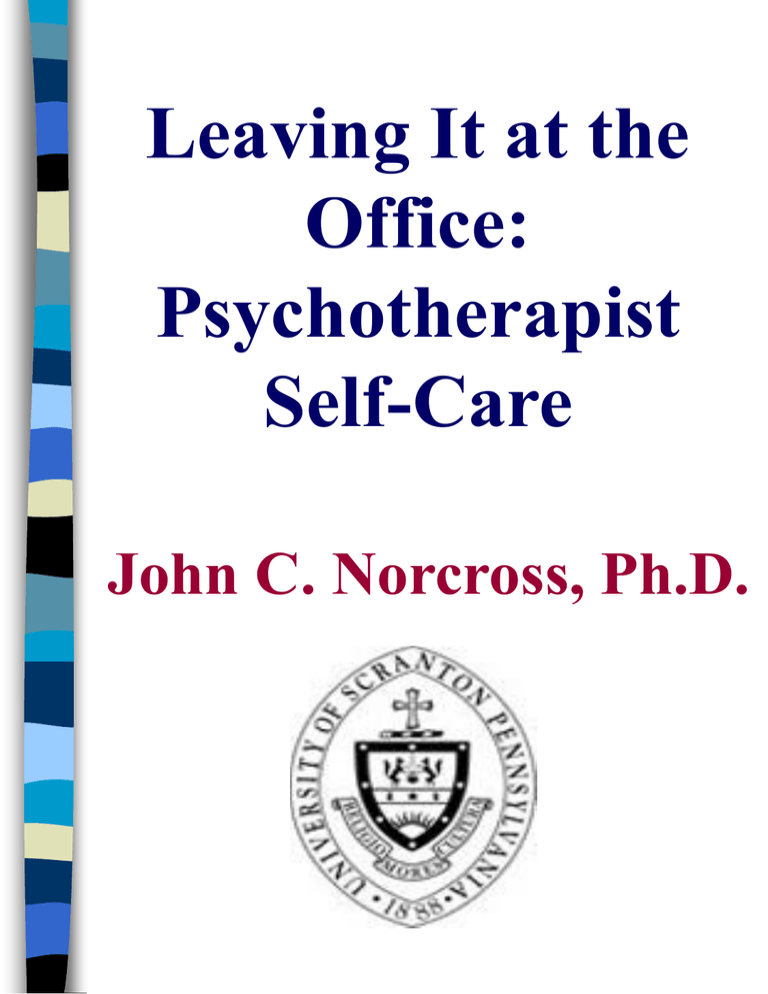
Leaving It at the Office: Psychotherapist Self-Care John C. Norcross, Ph.D. Description Conducting psychotherapy places additional and special burdens on the person of the therapist. This workshop puts the Socratic dicta of “know thyself” and “heal thyself”into practice. We shall focus on 12 self-care strategies that are clinician recommended, research based, and practitioner tested. Learning Objectives Participants will be able to: Generate at least 6 self-care strategies supported by the empirical research Conduct periodic selfassessments of their own self-care. Leave with an individualized action plan. What We Will NOT Do Light candles Inflate balloons Burn paper regrets Meditate together What We WILL Do Traverse the accumulating research on self-care Emphasize self-care principles or strategies Think with the mind of a scientist, feel with the heart of a humanist Embrace multiple strategies associated with diverse theoretical orientations Individualize your self-care to your own vulnerabilities The Paradox, Irony, & Ethics of Self-Care The Paradox: No time to sharpen the saw The Irony: Not availing ourselves of what we provide/recommend to clients The Ethics: Personally essential and professionally ethical Theoretical Orientation and Patient Care In treating patients, change processes vary reliably with the therapist's theory E.g., CBT therapists use counterconditioning, contingency management, and stimulus control significantly more E.g., Psychodynamic therapists rely more on the therapy relationship and catharsis Theoretical Orientation and Self-Care No differences in self-care processes due to therapist’s theory Not even a few statistically significant differences expected by chance alone. Results strongly argue for considerable similarity among psychotherapists in their own self-care Why No Differences? 1. In psychotherapist role, people rely heavily on theories. But in selfchange role, people are not as influenced by theory. 2. Possible duplicity between public careers and personal lives. 3. Therapists become more pragmatic, eclectic, and secular in their own selfcare. 12 Self-Care Strategies Principles or strategies, not techniques. Dozens of techniques under each strategy. Probably more effective to use multiple strategies than to extensively use a single strategy. Must tailor to your own resources and vulnerabilities to insure long-term success. 1. Valuing the Person of the Psychotherapist Easier to be wise and available for others than for ourselves. Self-care begins with the premise of valuing the person of the therapist. Alas, this runs against the tide of managed care and interchangeable “providers.” Self-Awareness and Commitment Top-ranked contributor in studies to optimal functioning Assess your self-care & satisfaction as you would a patient’s Writing, journaling, logging, self-monitoring, tracking Honest feedback from loved ones and coworkers Making self-care a priority Quis custodiet ipsos custodies (Who will guard the guards?) 2. Refocusing on the Rewards Re-experience Notice Feel the privileges the life rewards the career satisfaction Practice the mental set 3. Recognizing the Hazards The classic stressors of “impossible profession” The new & evolving distress Acceptance Begin with self-awareness and self-liberation 4. Minding the Body Don’t overlook the biobehavioral basics Sleep Bodily rest Nutrition and hydration Exercise Human contact 5. Nurturing Relationships Emphasize the human element At the Office Clinical colleagues Peer support Supervision groups Clinical teams Staff Professionals in community Mentors Clients 5. Nurturing Relationships (cont) Outside the Office Spouse/partner Family members Friends Colleague Assistance Programs Personal mentors Personal therapist 6. Setting Boundaries Delegate Boundary Balancing set client desires and self-preservation 7. Restructuring Cognitions Avoid wishful thinking & self- blame Monitor your internal dialogue Watch for selective abstraction, overwhelming tasks, and assuming causality (Judy Beck) Manage countertransference: self-insight, self-integration, empathy, anxiety management, & conceptualizing ability (Charles Gelso) Five Therapist Musterbations (Ellis) I must be successful with my patients, practically all of the time. I must be one of the world's most outstanding therapists. I should have no problems. After all, I am a therapist! I must be liked and respected by all my clients. Since I am a hard-working therapist, my clients should be equally persevering. 8. Sustaining Healthy Escapes True happiness, we are told, consists in getting out of one’s self. But the point is not only to get out – you’ve got to stay out; and to stay out you must have some absorbing errand (Henry James). Beware the prevalent unhealthy escapes: substance abuse, isolation, sexual acting out Variety in and outside of the office Some Absorbing Errands Vital breaks Relaxation Humor Hobbies Days off Vacations Restorative solitude Personal retreats Play: How do you play? 9. Creating a Flourishing Environment Use stimulus control - the most neglected strategy Avoid the fundamental attribution error (FAE) Take an environmental audit Work safety Business support Behavioral boundaries Institutional practices (high demands plus high constraints are toxic) A self-care village in a workaholic world 10. Undergoing Personal Therapy Commence personal tx at beginning (90% plus benefit) Pursue couples & family tx as well Confront your resistance not to pursue personal tx Supplement psychotherapy with personal analysis Return to tx periodically without shame (52% to 65% reinitiate) Obtain annual satisfaction checkup Only one form of self-development (e.g., creative arts, meditation, yoga) 11. Cultivating Spirituality & Mission Spirituality at the Office Remember your calling Reclaim your “mission” in life (Maslow) Care for others Commitment to growth Spirituality in clinical work 11. Cultivating Spirituality & Mission Spirituality Outside Office Pursuing ultimate questions Becoming a citizen-therapist (Tikkun ) Integrating religion/ spirituality into your personal life Letting your life speak 12. Fostering Creativity & Growth Passionately committed therapists: adaptive & open Everything comes together in the creative process Diversify: your therapy day, your clients, your prof activities Growth (e.g., CE, videotape yourself, prof organizations, interdisciplinary research) And, in the end, do more than survive: Thrive In Closing: A Curious Blend 1. How to 2. You should 3. Chill out Ave Atque Vale (Hail & Farewell) Please ♥ be gentle with yourself (selfempathy) ♥ remember that your life is a work in progress (temper corrosive expectations) ♥ recall that you cannot master or profit from all self-care possibilities (individualize) ♥ practice self-care as a skillful attitude and lifelong commitment Hail & Farewell
